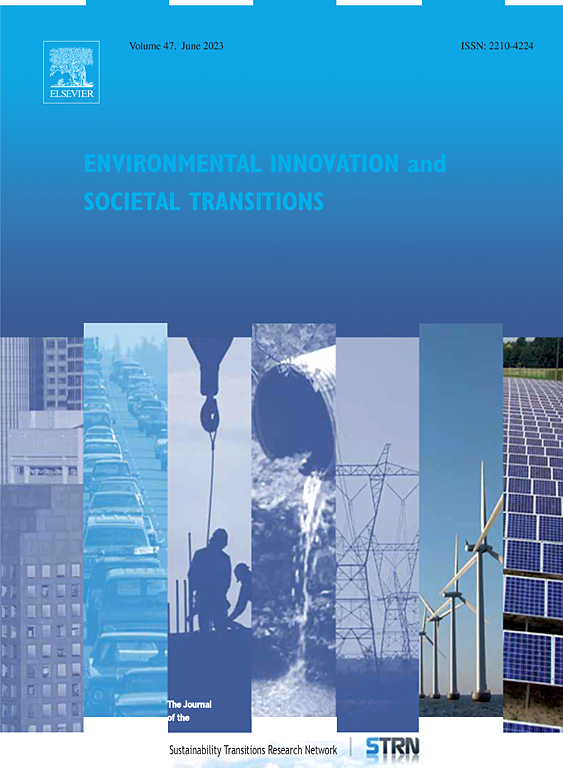Driving change? Exploring the role of socio-technical experiments in shaping autonomous mobility transitions
IF 5.7
2区 经济学
Q1 ENVIRONMENTAL SCIENCES
Environmental Innovation and Societal Transitions
Pub Date : 2025-04-04
DOI:10.1016/j.eist.2025.100993
引用次数: 0
Abstract
This systematic literature review inquires into the role of socio-technical experiments for autonomous driving and their potential to shape mobility transitions towards sustainability. As an emerging technology in an early stage of transition, AVs are increasingly being tested in different spatial contexts with diverse actor constellations in order to enhance the technology further. This article critically examines the added value of these experiments, how they affect the scaling-up of autonomous driving, and highlights key themes that researchers and practitioners should consider when designing experiments. The most striking aspect of our sample is the lack of continuous participatory methods, as well as weak linkages to the transition literature. Reflecting upon how existing experiments link to the core characteristics of socio-technical experiments, we derive central findings for future research avenues: Scaling-up of AVs requires greater involvement of policymakers and enhanced place-specific approaches, while comprehensive co-design experimentation relies on robust, long-term research infrastructures.
推动变革?探索社会技术实验在塑造自主移动转型中的作用
这篇系统的文献综述探讨了社会技术实验在自动驾驶中的作用,以及它们在塑造可持续性移动转型方面的潜力。作为一项处于转型早期的新兴技术,自动驾驶汽车正越来越多地在不同的空间环境中进行测试,并拥有不同的参与者星座,以进一步增强技术。本文批判性地考察了这些实验的附加价值,它们如何影响自动驾驶的规模,并强调了研究人员和从业者在设计实验时应该考虑的关键主题。我们的样本中最引人注目的方面是缺乏持续的参与性方法,以及与过渡文献的弱联系。反思现有实验如何与社会技术实验的核心特征联系起来,我们得出了未来研究途径的核心发现:自动驾驶汽车的扩大需要政策制定者的更多参与和增强的地方特定方法,而全面的协同设计实验依赖于强大的长期研究基础设施。
本文章由计算机程序翻译,如有差异,请以英文原文为准。
求助全文
约1分钟内获得全文
求助全文
来源期刊

Environmental Innovation and Societal Transitions
Energy-Renewable Energy, Sustainability and the Environment
CiteScore
13.60
自引率
19.40%
发文量
90
审稿时长
56 days
期刊介绍:
Environmental Innovation and Societal Transitions serves as a platform for reporting studies on innovations and socio-economic transitions aimed at fostering an environmentally sustainable economy, thereby addressing structural resource scarcity and environmental challenges, particularly those associated with fossil energy use and climate change. The journal focuses on various forms of innovation, including technological, organizational, economic, institutional, and political, as well as economy-wide and sectoral changes in areas such as energy, transport, agriculture, and water management. It endeavors to tackle complex questions concerning social, economic, behavioral-psychological, and political barriers and opportunities, along with their intricate interactions. With a multidisciplinary approach and methodological openness, the journal welcomes contributions from a wide array of disciplines within the social, environmental, and innovation sciences.
 求助内容:
求助内容: 应助结果提醒方式:
应助结果提醒方式:


